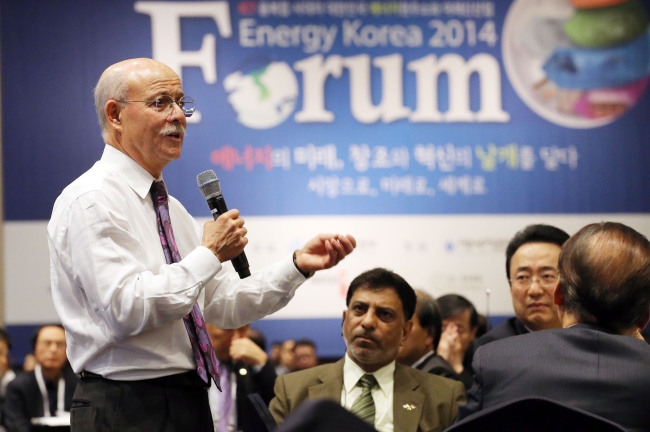Jeremy Rifkin, an internationally renowned economist and author, advised Korea to shift its gears to embrace renewable energy sources to better prepare for the era of the so-called “sharing economy.”
The sharing economy indicates a new paradigm under which people share a number of goods and services, including cars, homes and clothes, with one another via such new channels as social media sites, at low cost or even free of charge.
“Nuclear power (generation) is a mistaken business because of its enormous cost,’’ Rifkin said during a question-and-answer session held at the 2014 Korea Energy Show at the Grand InterContinental Hotel in Seoul on Wednesday.
The sharing economy indicates a new paradigm under which people share a number of goods and services, including cars, homes and clothes, with one another via such new channels as social media sites, at low cost or even free of charge.
“Nuclear power (generation) is a mistaken business because of its enormous cost,’’ Rifkin said during a question-and-answer session held at the 2014 Korea Energy Show at the Grand InterContinental Hotel in Seoul on Wednesday.

His comments came amid an ongoing debate here over the construction of new nuclear power plants.
Rifkin, author of the book “Third Industrial Revolution,” made it clear that nuclear power is an expensive energy source, considering the aggregated cost required to build a plant, to supply fresh water to cool reactors and to treat nuclear waste.
To replace what he calls expensive energy, the author proposed renewables like solar power that everyone can produce and share as an alternative energy source for natural resource-poor Korea.
“Korea has the technology and expertise (in the sector) to lead the energy transition,” he said.
Also at the session, Rifkin presented his new book “Marginal Cost Society,” adding that factors such as technology and a sharing economy driven by so-called “prosumers’’ will also play big roles in the energy sector.
Prosumers refer to proactive consumers who not only consume but also produce goods or services.
One of the world’s leading thinkers of today also issued a forecast on the approaching era of the Internet of Things.
“By 2030, it is estimated there will be more than 100 trillion sensors connecting the human and natural environment in a globally distributed intelligent network,” he said.
By Seo Jee-yeon (jyseo@heraldcorp.com)
-
Articles by Korea Herald




![[Herald Interview] 'Amid aging population, Korea to invite more young professionals from overseas'](http://res.heraldm.com/phpwas/restmb_idxmake.php?idx=644&simg=/content/image/2024/04/24/20240424050844_0.jpg&u=20240424200058)













![[KH Explains] Korean shipbuilding stocks rally: Real growth or bubble?](http://res.heraldm.com/phpwas/restmb_idxmake.php?idx=652&simg=/content/image/2024/04/25/20240425050656_0.jpg&u=)

